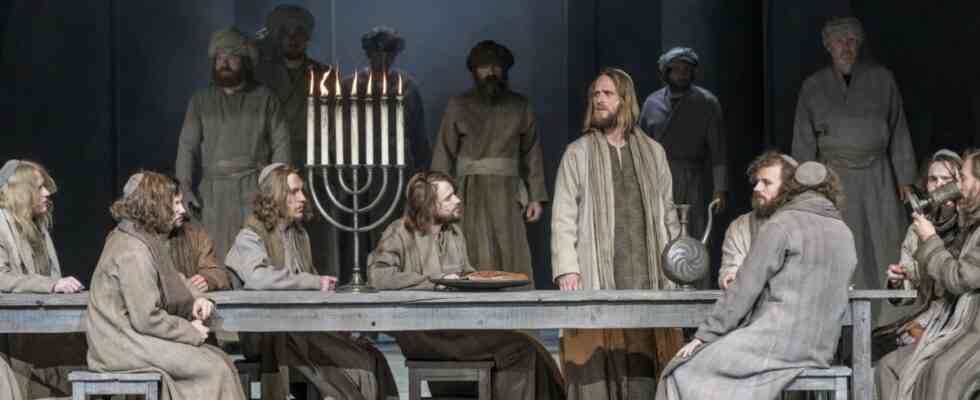Jesus has died on the cross more than 50 times. There will be a good 50 more times until October 2nd – and probably in front of almost sold-out spectator stands. Despite all sorts of adversities – the Corona crisis, war and inflation – 85 percent of all tickets have been sold by half-time for the Passion Play in Oberammergau. “I’m positive that we’re approaching 90 percent of the capacity utilization,” says managing director Walter Rutz on Friday.
“Things are going great for the difficult times,” agrees Frederik Mayet, spokesman and for the second time as Jesus on stage. Mayet recently found herself in a whole new situation. “Suddenly two apostles are hanging next to one on the cross.” Because both thieves were ill at home, two disciples had to be crucified at short notice. “Very, very exciting” and “awesome experience” is what Jakobus actor Yannick Schaap calls the unexpected crucifixions, which actually became a little torture for him. The crosses are custom made for the players – Jakobus was a bit too small.
The audience probably didn’t notice any of this, says director Christian Stückl. Cohesion and motivation are greater than ever with this passion. If someone drops out, the roles are reversed. Of course, the musical director Markus Zwink noticed a little distraction from the game among children who, when entering Jerusalem, would rather eat the bread that Jesus had distributed than sing.
If everything goes on like this, according to Rutz, there could be a surplus of around 25 million euros in the coffers. At the last Passion in 2010, which was almost completely sold out, it was 34 million euros. A portion of the proceeds will go towards the next Passion, scheduled for 2030. Preparations will start in two years. Sales activities will start in 2024, said Rutz. Unless something comes up again. In 2020, Stückl had postponed the passion by two years because of Corona. Tickets have been returned. Actors dropped out, they sometimes have to dig themselves free for half a year. Instead of the original 2000, there are still 1700 participants with children, still a third of the villagers.
Although all players are tested for Corona every day, gaps are noticeable. Sometimes a priest was missing, sometimes four apostles. The people were decimated – and the Romans also had bottlenecks. Although the role is popular with men because they don’t have to let their hair and beard grow, almost half of the planned 60 Romans were missing. This is how a Roman landed on the stage who has only lived in the village for a few years – a breach of the rules: only those who were born in Oberammergau or who have lived there for 20 years have the right to play. The case was resolved in the council. But the topic remains explosive. For Stückl, the 20-year rule is an “unjust law” and “pretty stupid.” It excludes and hinders integration. “Anyone who lives here should play along.” Two and a half to three years are practicable; in this period before a passion, the players are registered. “Integration has nothing to do with how long someone has been here,” says Stückl.
Mayor Andreas Rödl (CSU) assumes that the topic will end up again in the municipal council before the next Passion 2030 – where a reduction in 2016 failed. He leaves it open whether Stückl will bring the Passion 2030 to the stage for a fifth time. He doesn’t stick to the office, he says. Stückl has renewed the centuries-old game on many levels since 1990. He had supported the right to perform for all women, until 1990 only unmarried women under 35 were allowed on stage. He first gave leading roles to Protestants and later to Muslims. Above all, he rid the Passion of Christian anti-Judaisms.
For the second half of the Passion, the people of Oberammergau cannot sit back and relax. “Corona and Ukraine hang over us like Damocles,” says Managing Director Rutz. In addition, cards are mainly returned from abroad, but the German market absorbs this. How much remains in the till at the end also depends on inflation. This experience is 100 years old in the village: After the passion in 1922, some could have bought a property with their wages – a little later it was just enough for a jacket.
The passion plays go back to a plague vow. In 1633 the people of Oberammergau promised to perform the suffering, death and resurrection of Christ every ten years if the village were spared.

